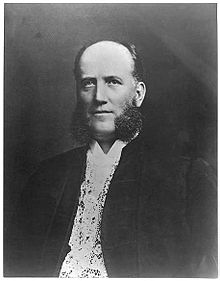Joseph Palmer Abbott
Sir Joseph Palmer Abbott KCMG | |
|---|---|
 | |
| Member of the NSW Legislative Assembly | |
| In office 29 November 1880 – 11 June 1901 | |
| Personal details | |
| Born | 29 September 1842 Turramurra, New South Wales |
| Nationality | Australian |
| Spouse(s) | Matilda Elizabeth Macartney (married 1873-1880) Edith Solomon (married 1883-1901) |
| Parent(s) | John Kingsmill Abbott Frances Amanda Brady |
| Occupation | Politician |

Sir Joseph Palmer Abbott,
Early life
Joseph Palmer Abbott was born on 29 September 1842 at
Upon completion of his education in 1857, he returned to the family station "Glengarry", near Wingen in the upper Hunter Region, where his mother had gone from Muswellbrook in 1847 upon the death of his father.[1]
Work
Abbott was admitted as a solicitor in 1865, and practiced law in
He was a director, and later
Politics
Abbott was nominated as a candidate for the
He was elected to the Legislative Assembly as the member for
He was not a candidate for Gunnedah at the 1887 election, but was nominated for Wentworth without his consent and easily topped the poll at the election on 26 February 1887.[10] He served as the member for Wentworth until he retired from parliament on 11 June 1901.[2][10]
He was one of the free traders turned protectionists in opposition to the Free Trade Party led by Sir Henry Parkes and was briefly the leader of the Opposition for the Protectionist Party from March 1887.[11] Abbott resigned as leader in May 1887 as he supported Parkes' plan to reform the standing orders of the Legislative Assembly, against the views of his followers.[1][12] He was nominated as a Protectionist candidate for East Sydney at the 1889 election, however he had been elected unopposed for Wentworth on the same day and the Free Trade Party won all four seats.[13]
Abbott was elected Speaker of the Legislative Assembly in 1890 and had a reputation as an authority on parliamentary procedure. He also imposed dignified control over the formerly unruly Assembly. He resigned the Speakership in 1900.
He was known for his work involving property laws of Australia, and as a New South Wales delegate for the Federation Conventions of 1891, 1897, and 1898 where he was Chairman of Committees.
Family and social life
He was initiated as a
He was knighted in 1892.
In 1873, at West Maitland, Abbott married Matilda Elizabeth (
- John Henry was a novelist and poet;[16]
- Mac was a solicitor and member of the New South Wales Legislative Assembly for Upper Hunter (1913–1918) and a Senator from 1935 to 1941.[17]
- Joe was a grazier and member for New England in the Australian House of Representatives from 1940 to 1949;[18] and
Abbott lived for a time in Tarella, an
References
- ^ ISSN 1833-7538. Retrieved 26 April 2019.
- ^ a b c d e "Sir Joseph Palmer Abbott (1842-1901)". Former members of the Parliament of New South Wales. Retrieved 26 April 2019.
- The Maitland Mercury and Hunter River General Advertiser. 20 January 1866. p. 4. Retrieved 8 November 2020 – via Trove.
- ^ Green, Antony. "January 1866 Williams by-election". New South Wales Election Results 1856-2007. Parliament of New South Wales. Retrieved 8 November 2020.
- The Maitland Mercury and Hunter River General Advertiser. 17 April 1866. p. 2. Retrieved 10 March 2021 – via Trove.
- ^ Green, Antony. "April 1866 Williams by-election". New South Wales Election Results 1856-2007. Parliament of New South Wales. Retrieved 10 March 2021.
- ^ "Nominations for Liverpool Plains". Evening News. 25 January 1870. p. 2. Retrieved 10 March 2021 – via Trove.
- The Maitland Mercury and Hunter River General Advertiser. 26 December 1874. p. 2. Retrieved 10 March 2021 – via Trove.
- ^ Green, Antony. "Elections for the District of Gunnedah". New South Wales Election Results 1856-2007. Parliament of New South Wales. Retrieved 9 March 2021.
- ^ a b Green, Antony. "Elections for the District of Wentworth". New South Wales Election Results 1856-2007. Parliament of New South Wales. Retrieved 3 November 2020.
- The Maitland Mercury and Hunter River General Advertiser. 10 March 1887. p. 5. Retrieved 26 July 2021 – via Trove.
- ^ "The leader of the opposition". The Sydney Morning Herald. 20 May 1887. p. 4. Retrieved 26 July 2021 – via Trove.
- ^ Green, Antony. "1889 East Sydney". New South Wales Election Results 1856-2007. Parliament of New South Wales. Retrieved 10 March 2021.
- ^ "Letters Patent". The London Gazette. No. 26298. 15 June 1892. p. 3513.
- ^ "Chancery of the Order of Saint Michael and Saint George". The London Gazette. No. 26628. 23 May 1895. p. 3080.
- ISSN 1833-7538. Retrieved 9 March 2021.
- ^ "Mr Macartney Abbott (1877-1960)". Former members of the Parliament of New South Wales. Retrieved 26 April 2019.
- ISSN 1833-7538. Retrieved 26 April 2019.
- Heritage Council of New South Wales.
